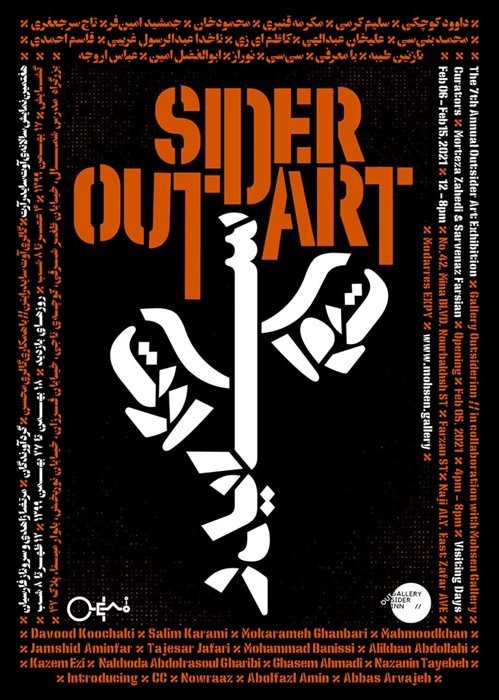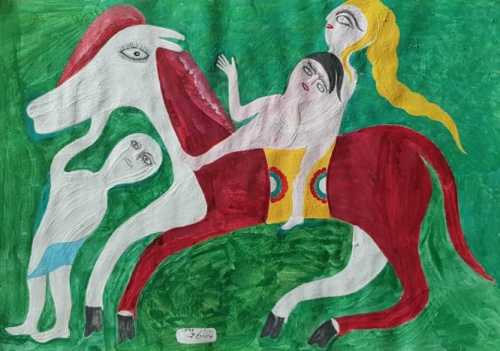Tehran,
#42, Mina Blvd., Nurbakhsh St., Farzan Alley, Naji Alley, Zafar Ave., Modarres Exp
5 February 2021 - 15 February 2021
Mohsen Gallery is delighted to announce “The 7th Annual Outsider Art Exhibition” from February 5 to 15, 2021. On the forehead of these mature, yet naïve works, there is an obvious rejection of the beliefs and myths of the region, on the one hand, and unadorned corners of life and its narratives, on the other.Davood Koochaki, Salim Karami, Mokarameh Ghanbari, Mahmoodkhan, Jamshid Aminfar, Tajesar Jafari, Mohammad Banissi, Alikhan Abdollahi, Kazem Ezi, Nakhoda Abdolrasoul Gharibi, Ghasem Ahmadi, Nazanin Tayebeh, CC, Nowraaz, Abolfazl Amin and Abbas Arvajeh are the exhibited artists in this exhibition.The twentieth century began with the emergence of a new reality and thus a new concept: relativity. Back then, convictions and values were no longer regarded as absolutes and reality was no longer what it seemed to be. The goal of the artist was to inquire about art in terms of a critical conversation with yesterday’s art. The artist had now found a new goal in his personal affections: imagination and emotional venting.In that period, Jean-Jacques Rousseau gave special attention to naturalism, emphasizing imagination and love. Friedrich Schiller wrote about naïve talent, “We have to consider natural talents.” Towards the end of the eighteenth century, a group of artists came together and they were the first to undermine technical skills. Van Gogh had a decisive impact in this regard. There is an obvious quality in his paintings that the romantics sought after: intensity.In fact, that is how artistic expressiveness and its pioneers received much attention as modern art began to emerge. During that time, modern art started to make progress and childlike aspects of art started to play a more significant role. The Italian novelist, Cesare Pavese, has famously said, “Modern art is a return to infancy.” The CoBrA group advocated straightforward expression with no logical control. The members of this group were all interested in children’s art. Picasso always wanted to draw like a child. Paul Klee considered children’s paintings more potent than his own. Now the question is how the sudden interest in childhood and the return to origins, the increasing interest in simplicity, sincerity, and instincts, came into attention in the second half of the eighteenth century and how a more liberal space was created for art. The objective representation of visible reality was considered not to be plausible anymore and depicting the inward relation of the artist with the subject matter was understood to be the nature of painting and sculpture. This is exactly what an outsider artist expresses with no inhibitions in an exemplary fashion. There is a unique harmony to this artistic inclination that links the objects together, and it results in the favorable relation between the artist and a given subject matter. The artist acts with an open mind. He has no knowledge of the peculiarities and frameworks of how an artwork is created. More specifically, he knows nothing about artistic problems. Thanks to that open mind, outsider art develops its artistic language, based on immediacy and the avoidance of an intense engagement with the subject matter.An outsider artist was born a narrator that has found the first chance to tell his story. However, he has been preparing himself with an inner monolog, anticipating the proper moment for visual sense of expression. This moment starts with a fundamental change in the artist’s personal life, things such as disease, the death of a partner, retirement, etc. This is the moment when a psychological mechanism is triggered to compensate for the loss and thus images are arranged from memory or the subconscious in an altered and uncontrollable fashion. In this stage, dream and reality are intermingled and the resulted imagery earns the admiration of surrealists. The artist feels a sense of freedom concerning his work, because he merely depicts nothing less than experiences of his own life. Therefore, outsider art is by and large a sincere enterprise. In this sense, the inner child is not completely silenced and the world is regarded as a huge, magic, inspiring playground. Simple things become significantly valuable. The artist’s simple relation to ordinary things, such as everydayness, the home, birth, and flourishment, become particularly important, which can help humans cope with existence.

